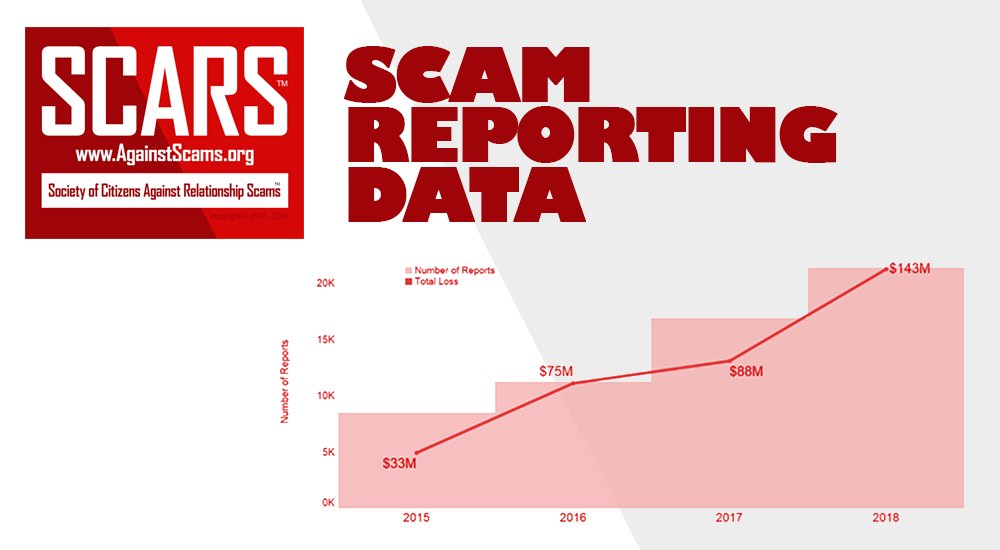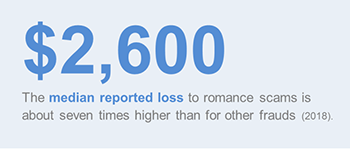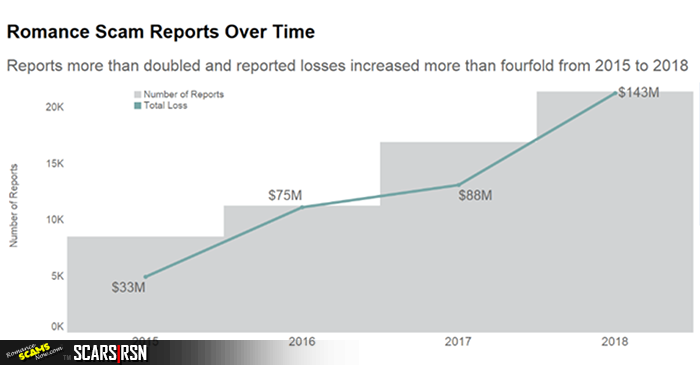SCARS™ Analytics: Romance Scams Rank Number One On Total Reported Losses
According to the Bureau of Consumer Protection at the Federal Trade Commission, Romance Scams Come Out On Top!
People looking for romance are hoping to be swept off their feet, not caught up in a scam. But tens of thousands of reports in Consumer Sentinel show that a scam is what many people find.
In 2018, the FTC’s Sentinel had more than 21,000 reports about romance scams, and people reported losing a total of $143 million – that’s more than any other consumer fraud type identified in Sentinel.
These reports are rising steadily. In 2015, by comparison, people filed 8,500 FTC Sentinel reports with dollar losses of $33 million.
Of course, this is a small percentage of the actual number of romance scams. We know this because only 3-5% of victims will report these crimes
Romance scammers lure people with phony online profiles, often lifting photos from the web to create attractive and convincing personas. They might make up names or assume the identities of real people. Reports indicate the scammers are active on dating apps, but also on social media sites that aren’t generally used for dating. For example, many people say the scam started with a Facebook message.
Once these fraudsters have people by the heartstrings, they say they need money, often for a medical emergency or some other misfortune. They often claim to be in the military and stationed abroad, which explains why they can’t meet in person. Pretending to need help with travel costs for a long-awaited visit is another common ruse.
Scammers can reap large rewards for time spent courting their targets. The median individual loss to a romance scam reported in 2018 was $2,600, about seven times higher than the median loss across all other fraud types.2 People often reported sending money repeatedly for one supposed crisis after another.
People who said they were ages 40 to 69 reported losing money to romance scams at the highest rates – more than twice the rate of people in their 20s. At the same time, people 70 and over reported the highest individual median losses at $10,000.
- Among people who told the FTC how they paid the scammer, the majority said they wired money (through their bank or a money transfer service).
- The next largest group said they sent money using gift and reload cards (like Moneypak), and reports of this type of payment increased in 2018.
- People said they mailed the cards or gave the PIN number on the back to the scammer.
Con artists favor these payment methods because they can get quick cash, the transaction is largely irreversible, and they can remain anonymous.
So what can singles do to play it safe while dating online? Here are some tips to help spot bogus suitors:
- Never send money or gifts to a sweetheart you haven’t met in person.
- Talk to someone you trust about this new love interest. In the excitement about what feels like a new relationship, we can be blinded to things that don’t add up. Pay attention if your friends or family are concerned.
- Take it slowly. Ask questions and look for inconsistent answers. Try a reverse-image search of the profile pictures. If they’re associated with another name or with details that don’t match up, it’s a scam.
PLEASE SHARE OUR ARTICLES WITH YOUR CONTACTS
HELP OTHERS STAY SAFE ONLINE
SCARS™ Team
A SCARS Division
Miami Florida U.S.A.
TAGS: SCARS, Important Article, Information About Scams, Anti-Scam, Romance Scams, FTC, Scam Data, Scam Reporting, Federal Trade Commission
The Latest SCARS|RSN Posts
FIND MORE SCAM NEWS
«SCAMCRIME.COM»
CHAT WITH SCARS™
«CLICK HERE»
END
MORE INFORMATION
– – –
Tell us about your experiences with Romance Scammers in our
« Scams Discussion Forum on Facebook »
– – –
FAQ: How Do You Properly Report Scammers?
It is essential that law enforcement knows about scams & scammers, even though there is nothing (in most cases) that they can do.
Always report scams involving money lost or where you received money to:
- Local Police – ask them to take an “informational” police report – say you need it for your insurance
- Your National Police or FBI « www.IC3.gov »
- The SCARS|CDN™ Cybercriminal Data Network – Worldwide Reporting Network « HERE » or on « www.Anyscam.com »
This helps your government understand the problem, and allows law enforcement to add scammers on watch lists worldwide.
– – –
Visit our NEW Main SCARS Facebook page for much more information about scams and online crime: « www.facebook.com/SCARS.News.And.Information »
To learn more about SCARS visit « www.AgainstScams.org »
Please be sure to report all scammers
« HERE » or on « www.Anyscam.com »
Legal Notices:
All original content is Copyright © 1991 – 2020 SCARS All Rights Reserved Worldwide & Webwide. Third-party copyrights acknowledge.
SCARS, RSN, Romance Scams Now, SCARS|WORLDWIDE, SCARS|GLOBAL, SCARS, Society of Citizens Against Relationship Scams, Society of Citizens Against Romance Scams, SCARS|ANYSCAM, Project Anyscam, Anyscam, SCARS|GOFCH, GOFCH, SCARS|CHINA, SCARS|CDN, SCARS|UK, SCARS Cybercriminal Data Network, Cobalt Alert, Scam Victims Support Group, are all trademarks of Society of Citizens Against Relationship Scams Incorporated.
Contact the law firm for the Society of Citizens Against Relationship Scams Incorporated by email at legal@AgainstScams.org














Leave A Comment